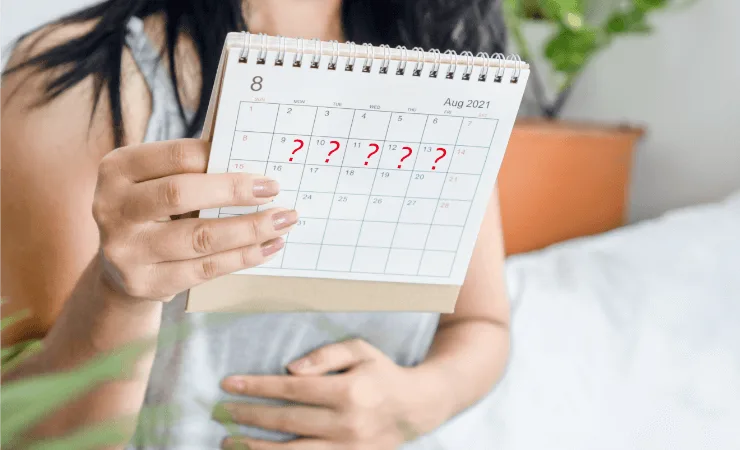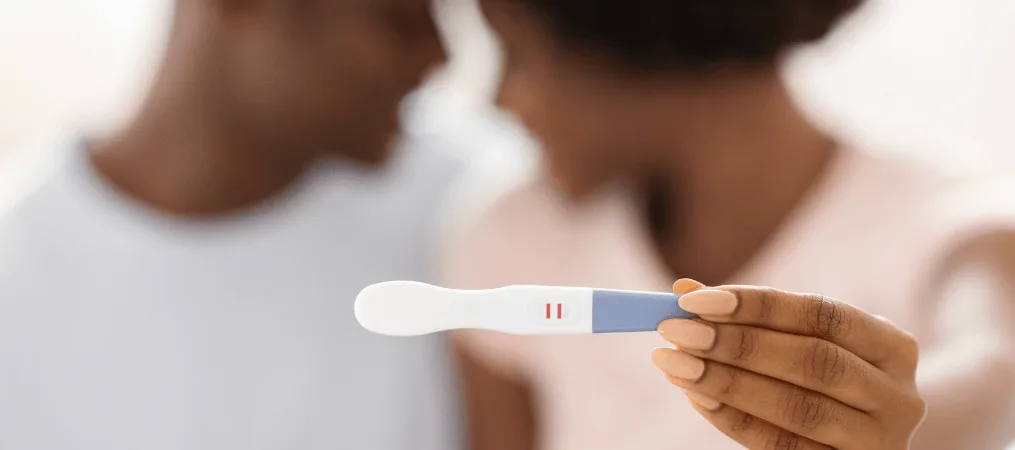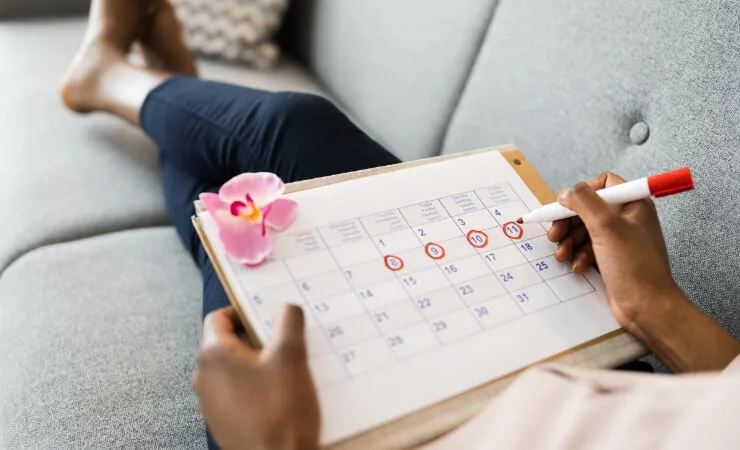1 or 2 day period: What does it mean?

It is normal to be worried if you’ve suddenly begun having a 2 day period or a short period compared to your usual length. Many wonder, ‘I got a 1 day period, am I pregnant?’. There are many factors that could result in short periods like if you’ve started using birth control, any lifestyle changes or an early sign of pregnancy among others.
What is the length of a normal period?

When you begin menstruating in life, it may take a while for your body to get things going smoothly and your periods to come regularly. Your periods may not always last the same number of days or be the same number of days apart. You might have a light flow one month and a heavy flow the next.
Your periods and cycles will probably become much more regular as you get older. For context, a normal menstrual cycle occurs around once every 28 days, but this may vary every month. Some women have a 21-day menstrual cycle, while others get their periods 35 days apart.
So, how long does a period last? Every woman is different and when it comes to periods, it typically lasts for around three to five days each month. It is important to note that a 2-day period or one that lasts for seven days, is considered normal as well.
Causes of short period
A short period, i.e. either a 1-day period or a 2-day period, could be the result of numerous reasons. If you’ve suddenly started experiencing a shorter period after having a period that typically lasts for several days, then the below reasons could be the cause.

1. Pregnancy
Many women experience spotting in the initial stages of pregnancy. Some may mistake spotting for a short period. Don’t worry, spotting doesn’t necessarily mean it’s a bad thing. Spotting or light bleeding may occur a week or two after fertilisation when the egg attaches to the uterine lining, also known as implantation bleeding.
2. Miscarriage or loss of pregnancy
Bleeding can be normal during pregnancy, but it may also, at times, indicate a problem. If there is bleeding early in the pregnancy, it may be due to pregnancy loss which may begin as light spotting, but typically gets heavier as it progresses. It is also accompanied by painful, abdominal cramps.
3. Ectopic Pregnancy
Sometimes, an ectopic pregnancy can also cause bleeding. An ectopic pregnancy is when the fertilised egg implants outside the uterus, mostly in a fallopian tube. Someone in this condition must get medical help immediately as rupturing of the fallopian tube can cause bleeding and severe pain.
4. Perimenopause
Women who are in perimenopause can experience short periods and other fluctuations in their cycle. Perimenopause is the phase leading up to menopause, which is when a menstruating person stops getting monthly periods. Moreover, it can also result in missed periods.
5. Anovulatory cycle
When a menstruating person’s ovaries do not release an egg, that person is said to have an anovulatory cycle. It can cause irregular periods and heavy bleeding. Some symptoms of an anovulatory cycle include irregular periods, skipped periods, lighter or heavier bleeding, etc.
6. PCOS
Polycystic Ovarian Syndrome is a condition due to hormonal imbalance affecting females of childbearing age. It prevents the ovaries from developing or releasing monthly eggs. Irregular menstrual periods, among many others, is a characteristic feature of PCOS.
7. Birth control
Women who use or switch birth control may experience breakthrough bleeding. It is a small amount of bleeding outside of your monthly period. This can happen with the use of any type of birth control, but occurs more often with:
- Birth control implants, which is a tiny rod that releases hormones
- low-dose and very low-dose birth control pills
- hormonal IUDs, small T-shaped devices placed in the cervix
8. Breastfeeding
If you are breastfeeding, it is normal and usual to get a delayed, lighter, or a short period. Moreover, prolactin, which is a hormone that helps make breast milk, also prevents menstruation from occurring. Therefore, you’ll notice that most women who breastfeed don’t get their period and resume it around 9 to 18 months after their baby is born.
9. Other lifestyle factors
The way you live, eat among other habits play a huge role in your menstrual health. Factors such as stress, excessive exercising or extreme weight fluctuations can also lead to irregular periods, short period or even lead to a skipped period.
10. Thyroid
It is a disease that causes your body to produce too much or too little thyroid hormone, which is a significant part of your menstrual cycle. When your body doesn’t produce the right amount of this hormone, your periods can become irregular and can sometimes become shorter than usual.
Stay prepared for your period, be it a 2-day period or a longer one. Trust Always’ range of sanitary pads which provide ultimate comfort and protection. The ALWAYS Ultra Thin sanitary pads have a super absorbent core with the InstantDry System that absorbs menstrual discharge in just a few seconds. The Ultra Thin pad is also armed with flexible wings, so it stays in place no matter what you do, offering up to 100% comfortable protection.
If you prefer using tampons, you can try the Always TAMPAX Compak tampons that come with a smooth, compact applicator for discretion, and a built-in protective skirt to help prevent leakage for
Looking to manage your period cycle better? Our guide shares practical tips on how to make period end faster that you can try today.
When to see a doctor?

Since there are so many instances in which a short period could be an indication of an underlying medical condition or may just need medical supervision, it is important to be cautious and keep a check on the symptoms. Here’s a list of all the signs to watch out for and call your doctor if you notice them:
- If you have periods that become irregular after having them regularly
- If you get periods every 38 days or more than every 24 days
- If you notice your menstrual blood flow contains blood clots larger than a quarter
- If you experience pelvic pain even when you are not menstruating
- If you bleed when you are not menstruating
- If you notice unusual and particularly heavy bleeding
- If you’ve missed a period for three months consecutively.
Takeaway
If you have always had what is considered as normal period length and have suddenly begun having 1-day periods or short periods, then it needs to be investigated. While pregnancy is often the reason, there are multiple other causes as well. Consult your doctor to get the right diagnosis and medical guidance.
Read more about period symptoms and what causes period pains.
Stay well prepared for your next period by tracking it on Always Period Calculator.
FAQs
Is it normal for my period to last 1 day?
A normal menstrual cycle occurs around once every 28 days, but this may vary every month. Some women have a 21-day menstrual cycle, while others get their periods 35 days apart. Every woman is different and when it comes to periods, it typically lasts for around three to five days each month. It is important to note that even a 2-day period or one that lasts for seven days, is considered normal mention as long as it has been your usual cycle. If the change is sudden then you must visit a doctor.
What causes a 1-day period?
Pregnancy, miscarriage, PCOS, perimenopause, birth control methods, anovulatory cycles amongst many other reasons could lead to a 1-day period. It is important to be cautious, observe the symptoms and consult a doctor.
My period only lasted 2 days, when should I take a pregnancy test?
A 2-day period is definitely on the shorter end of the period length spectrum but it’s normal for your period length and flow to differ every month. Typically, you can take an at-home pregnancy test from the first day of your missed period. In this case, the sooner you take the test, the better it is to put your mind at ease.
Disclaimer:
Please note the date of last review or update on all articles. No content on this site, regardless of date, should ever be used as a substitute for direct medical advice, diagnosis or treatment from your doctor or other qualified clinician. Always is committed to ensuring that all of our products meet rigorous safety standards; Always pads prioritize safety, protection and comfort of its consumers.




